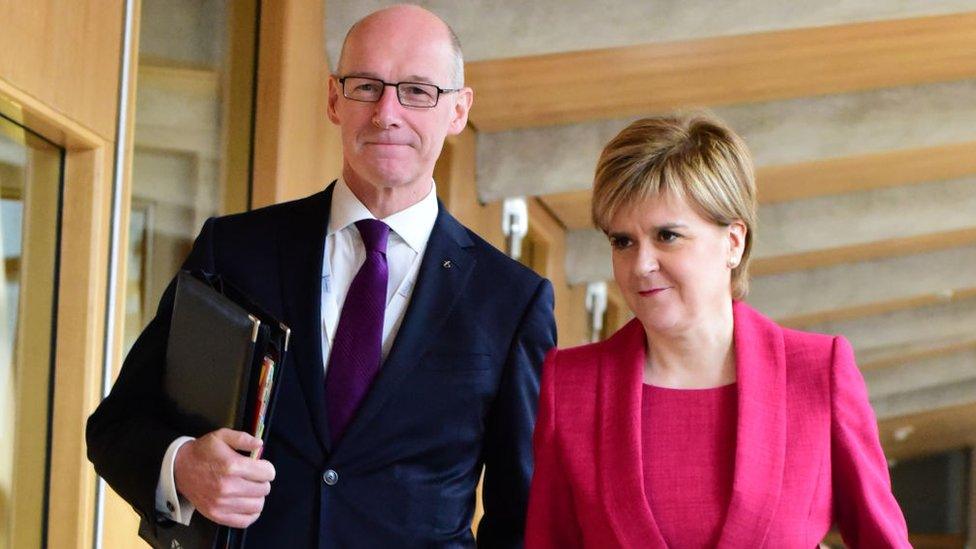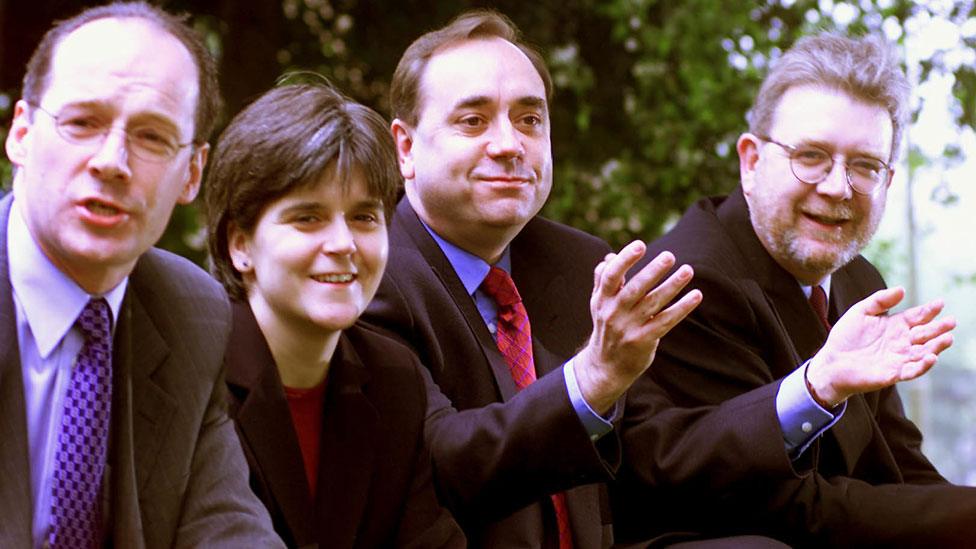John Swinney rules himself out of SNP leadership race
- Published

John Swinney has been Nicola Sturgeon's deputy for eight years
Deputy First Minister John Swinney has ruled himself out of the race to be the next leader of the SNP.
Mr Swinney said he had to do what was "right for my family, the Scottish National Party and our country".
It comes after the SNP's national executive said the new leader will be confirmed on Monday 27 March.
Nicola Sturgeon announced on Wednesday that she was resigning after eight years as SNP leader and first minister.
Mr Swinney, who has been a member of the Scottish Parliament since 1999, served as leader of the party between 2000 and 2004.
No one has formally entered the contest yet and but Mr Swinney told BBC Scotland he may endorse a candidate.
The deputy first minister had been tipped for a return to the top job and admitted he had "thought carefully about whether I should stand".
But in a post on Twitter, external he said he had instead decided to "create the space for a fresh perspective to emerge".
"For the best part of the last 40 years, I have had the privilege of being at the very heart of formulating the strategy of the SNP," Mr Swinney said.
"From a very poor starting point in the 1980s, I am proud to have played my part in building the SNP into a successful party of government in Scotland with an impressive electoral record.
"The refusal however of the UK government to respect the democratic wishes of the people of Scotland to have a referendum on independence, requires the SNP to consider carefully, and in my view with a fresh perspective, how to pursue our aims.
"To create the space for that fresh perspective to emerge, I have decided not to be a candidate for leadership in the SNP. At this critical moment, I believe there must be an open debate within the SNP about our direction."
He added: "I encourage those who stand for election to bring forward perspectives that anchor the SNP in the mainstream of Scottish politics, which is an absolutely critical requirement for the future success of our cause."

John Swinney, pictured with SNP colleagues in 1999, says he has spent almost 40 years "at the heart of the SNP"
Mr Swinney told BBC Radio's Good Morning Scotland he was not going to express a preference for Ms Sturgeon's successor.
But he added: "I may say something more about it in due course but, at this stage, I will keep my counsel until I hear who is in the running."
Asked if he wanted to stay on as deputy first minister, Mr Swinney said that would be a matter for the new first minster.
He also told the programme independence was a means of addressing the issues that matter to people in Scotland and highlighted the example of a company in his constituency who he said was struggling to recruit staff due to Brexit.
The deputy first minister also said he had "no regrets" over the gender recognition legislation but added he would rather there were no issues that divided the party.
Asked about a tweet , externalby former minister Ash Regan which called for the party to removes the ruling which bars MPs also standing in Holyrood elections, Mr Swinney said any party member was free to stand if they could secure enough support.
He also highlighted the case of Neil Gray who gave up his seat at Westminster to become an MSP.
Nominations for the post of SNP leader have already opened and will close at noon on Friday 24 February.
The party's national executive said the new leader would be selected on a one-member-one-vote basis.
Possible contenders include:
Kate Forbes, finance secretary who underwent a meteoric rise in recent years. Currently on maternity leave
Angus Robertson, who previously headed the SNP's Westminster group and was a vocal critic of Theresa May's government following the 2015 election
Humza Yousaf, health secretary who has held several senior posts in government. Part of a new generation of SNP figures
Keith Brown, justice secretary seen as an outsider bet.
Two other high-profile SNP figures previously tipped to replace Ms Sturgeon have also ruled themselves out.
The party's leader at Westminster, Stephen Flynn, said the top job should go to an MSP.
And confirming she would not stand, fellow MP Joanna Cherry said the SNP "needs a leadership election that is about policies and not personalities".
Nicola Sturgeon plans to remain in office until her successor is elected.
She made her resignation announcement at a hastily convened news conference at her official Edinburgh residence, Bute House, on Wednesday but insisted it was a decision she had been weighing up for some time.
"In my head and in my heart I know that time is now. That it's right for me, for my party and my country," she said.


John Swinney is a vastly experienced figure in the Scottish government and hugely popular within the SNP.
If he had run, he would have been difficult for other candidates to beat and only the boldest would have stood against him.
His decision not to go for the top job opens up the potential for a wider contest.
Health Secretary Humza Yousaf is reported to be preparing to declare and Finance Secretary Kate Forbes is understood to be considering standing.
Some have started to doubt that Constitution Secretary Angus Robertson will go for it but neither he nor Justice Secretary Keith Brown have ruled themselves out.
Mr Brown is also deputy leader of the SNP, so his decision-making could potentially create a contest for that job too.
Former minister Ash Regan - who quit government over the gender recognition reform bill - is said to be "strongly considering" putting her name forward.
Minister for Europe and International Development Neil Gray is another possible.
While MPs are also able to stand, it seems unlikely any will because you have to be an MSP to take over as first minister.